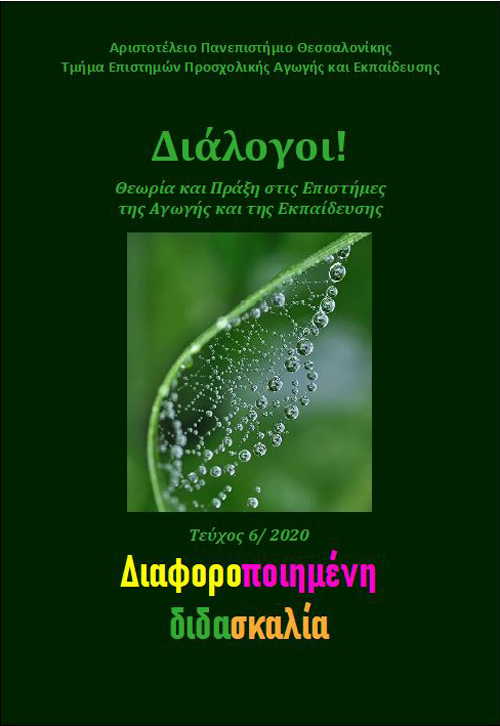Ο Συνδυασμός της διαφοροποιημένης διδασκαλίας και της γλωσσικά κατάλληλης πρακτικής προς μια πολιτισμικά και γλωσσικά ευαισθητοποιημένη παιδαγωγική: Μια έρευνα δράσης σε μια τάξη υποδοχής

Περίληψη
Η παρούσα έρευνα δράσης πραγματεύεται την επίδραση της Διαφοροποιημένης Διδασκαλίας και της Γλωσσικά Κατάλληλης Πρακτικής στην εκπαίδευση μαθητών με μεταναστευτικό υπόβαθρο. Αντλώντας δεδομένα από το έργο ακαδημαϊκών (Tomlinson, Santamaria, Valiandes, Sfyroera, Chumak-Horbatsch), εξετάζεται το αποτέλεσμα της μίξης των δύο πρακτικών στη μαθησιακή διαδικασία και οι αντιλήψεις των μαθητών σχετικά με τη χρήση της νέας πρακτικής.
Στο πλαίσιο αυτής της έρευνας, επτά μαθητές μεταναστευτικού υπόβαθρου (10-12 ετών), συμμετείχαν σε μια παρέμβαση πέντε ερευνητικών κύκλων. Η έρευνα διεξήχθη σε Τάξη Υποδοχής δημοτικού σχολείου του Πειραιά, την Άνοιξη του 2019. Η ερευνήτρια-εκπαιδευτικός μέσω συμμετοχικής παρατήρησης και ερευνητικών ημερολογίων συνέλεξε τα δεδομένα και αναστοχάστηκε πάνω στα αποτελέσματα κάθε κύκλου έρευνας. Συγκεντρώθηκαν επίσης ποιοτικά δεδομένα που προέκυψαν από τη συζήτηση της ομάδας εστίασης των μαθητών σχετικά με τις αντιλήψεις τους για τη νέα πρακτική.
Τα ευρήματα έδειξαν ότι η Διαφοροποιημένη Διδασκαλία μέσα στο πλαίσιο της Πολιτισμικά και Γλωσσικά Ανταποκρινόμενης Παιδαγωγικής είχε θετικές επιδράσεις στους εκπαιδευόμενους όσον αφορά την εμπλοκή τους στην μαθησιακή διαδικασία, καθώς έδειξαν αυξημένα κίνητρα, οι διαπροσωπικές τους σχέσεις βελτιώθηκαν, ενώ όλοι δέχτηκαν τη νέα πρακτική χωρίς σοβαρούς δισταγμούς. Εκ μέρους των μαθητών, όλοι σχολίασαν θετικά τα πολλαπλά υλικά, την παιγνιώδη φύση των δραστηριοτήτων καθώς και την πολιτισμική και γλωσσική συνειδητοποίηση που προωθήθηκε.
Λεπτομέρειες άρθρου
- Πώς να δημιουργήσετε Αναφορές
-
Dimadi, S., & Vitsou, M. (2020). Ο Συνδυασμός της διαφοροποιημένης διδασκαλίας και της γλωσσικά κατάλληλης πρακτικής προς μια πολιτισμικά και γλωσσικά ευαισθητοποιημένη παιδαγωγική: Μια έρευνα δράσης σε μια τάξη υποδοχής. Διάλογοι! Θεωρία και πράξη στις επιστήμες αγωγής και εκπαίδευσης, 6, 159–208. https://doi.org/10.12681/dial.22983
- Τεύχος
- Τόμ. 6 (2020)
- Ενότητα
- Ειδικό Θέμα

Αυτή η εργασία είναι αδειοδοτημένη υπό το CC Αναφορά Δημιουργού – Μη Εμπορική Χρήση – Παρόμοια Διανομή 4.0.
Οι συγγραφείς των άρθρων που δημοσιεύονται στο Διάλογοι! Θεωρία και Πράξη στις Επιστήμες Αγωγής και Εκπαίδευσης διατηρούν τα δικαιώματα πνευματικής ιδιοκτησίας επί των άρθρων τους, δίνοντας στο περιοδικό το δικαίωμα της πρώτης δημοσίευσης. Άρθρα που δημοσιεύονται στο Διάλογοι! Θεωρία και Πράξη στις Επιστήμες της Αγωγής και Εκπαίδευσης διατίθενται με άδεια Creative Commons 4.0 και σύμφωνα με την άδεια μπορούν να χρησιμοποιούνται ελεύθερα, με αναφορά στον/στη συγγραφέα και στην πρώτη δημοσίευση για μη κερδοσκοπικούς σκοπούς και με δικαίωμα τροποποίησης μόνον με παρόμοια διανομή (αν αναμείξετε, τροποποιήσετε, ή δημιουργήσετε πάνω στο υλικό, πρέπει να διανείμετε τις δικές σας συνεισφορές υπό την ίδια άδεια όπως και το πρωτότυπο).
To Τμήμα Επιστημών Προσχολικής Αγωγής και Εκπαίδευσης του Αριστοτέλειου Πανεπιστημίου Θεσσαλονίκης και το Εθνικό Κέντρο Τεκμηρίωσης διατηρούν το δικαίωμα να δημοσιεύουν, να αναπαραγάγουν, να παρουσιάζουν στο κοινό, να διανέμουν και να χρησιμοποιούν άρθρα που δημοσιεύονται στο Διάλογοι! Θεωρία και Πράξη στις Επιστήμες Αγωγής και Εκπαίδευσης σε οποιοδήποτε μέσο και μορφή είτε μεμονωμένα είτε ως μέρη συλλογικών έργων, για όλο το χρόνο διάρκειας προστασίας της πνευματικής ιδιοκτησίας και για όλες τις χώρες του κόσμου.
Αυτό περιλαμβάνει ενδεικτικά, και όχι αποκλειστικά, το δικαίωμα δημοσίευσης των άρθρων σε τεύχη του περιοδικού Διάλογοι! Θεωρία και Πράξη στις Επιστήμες Αγωγής και Εκπαίδευσης, αναπαραγωγής και διανομής μεμονωμένων αντιγράφων των άρθρων, αναπαραγωγής ολόκληρων των άρθρων σε άλλη έκδοση του Τμήματος Επιστημών Προσχολικής Αγωγής και Εκπαίδευσης του Αριστοτέλειου Πανεπιστημίου Θεσσαλονίκης και του Εθνικού Κέντρου Τεκμηρίωσης και αναπαραγωγής και διανομής των άρθρων ή περίληψης αυτών με χρήση πληροφορικού συστήματος αποθετηρίου.


